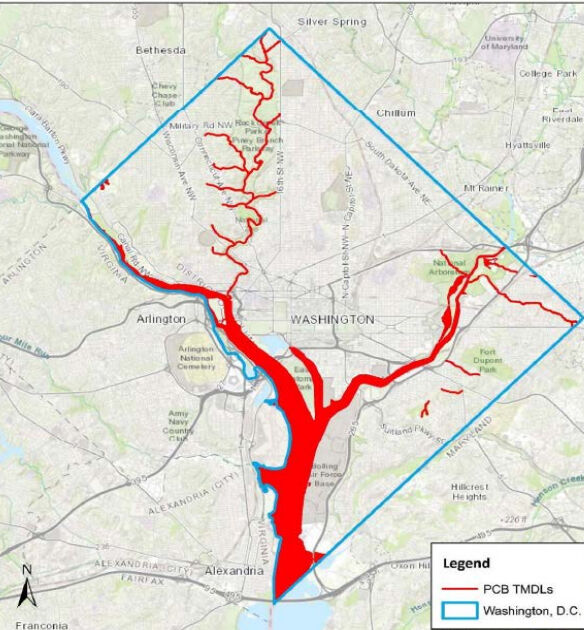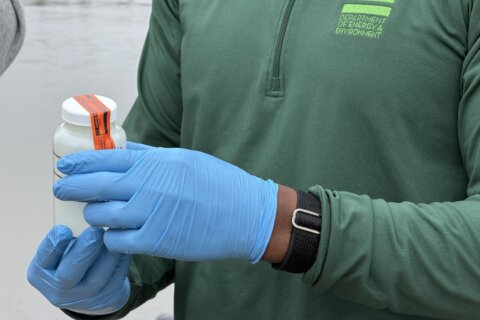D.C. is suing Monsanto Co. and two affiliated companies, alleging they knowingly manufactured, promoted and sold toxic chemicals that polluted the Potomac River and its tributaries.
In the lawsuit, D.C. Attorney General Karl Racine accuses Monsanto Co., which is known for making the herbicide Roundup, of knowing the damage that polychlorinated biphenyls, better known as PCBs, could do to waterways, wildlife and people living in the District.
The suit alleges that Monsato:
- Knowingly sold toxic and harmful products;
- Misled consumer and regulators to maximize profits;
- Damaged D.C.’s natural resources;
- Cost the city millions in environmental cleanup.
The suit alleges the chemical giant made false claims to regulators over decades.
The other two companies named are former Monsanto companies — Solutia, which took over Monsano’s chemical business, and Pharmacia, which took over Monsanto’s pharmaceutical business.
PCBs were used in a variety of products, including dyes, lubricants, paints, caulks, inks, sealants, plasticizers, coolants, hydraulic fluids, fireproofing and electrical equipment such as capacitors and transformers from 1929 until they were banned.
PCBs, which were banned in the U.S. in 1979, are known to be carcinogenic.
“In addition to causing cancer, exposure to these chemicals has been shown to cause medical problems including liver damage, skin rashes, eye problems, damage to the immune system, and problems with memory and learning,” a news release from Racine said.
The lawsuit says the PCBs entered the environment “during and prescribed uses.” PCS also entered the environment through spills or leaks in the “ordinary course of business such as through transport of the chemicals, and from leaks or fires in transformers, capacitors, or other products containing PCBs, and from the burning of wastes in some municipal or industrial incinerators.”
PCBs and PCB-contaminated wastes ended up in landfills and leached in the surrounding environment, the suit says.
The lawsuit also says:
Monsanto also knew or should have known that PCBs bio-accumulate and biomagnify in animal tissue, including in fish tissue and human tissue. As a result, as time passes, PCB contamination poses an increasingly hazardous threat to the health of the District’s residents.”
All of the waterbodies in the District have been identified as “impaired” because
the PCBs in those waterbodies exceed the District’s Water Quality Standards. None of the District’s monitored waters are supporting all of their designated uses, and they generally do not support uses by humans and aquatic life.”
D.C. has spent hundreds of millions of dollars trying to clear PCBs from the District, and Racine wants Monsanto to cover the past, present and future expenses of that effort.
Historically, the Potomac River that flows through D.C. has been known for its pollution, and while some progress has been made to clean up the river, it continues to have problems. Pollution, as well as toxic chemicals and metals, have over the years prompted officials to tell people to avoid some water activities.
PCBs are the reason that D.C. tells people fishing in D.C. waterways not to eat the eel, carp and rockfish that they catch.
In addition to the Potomac River, the lawsuit names 30 other rivers and tributaries impaired by excessive levels of PCBs and included a map of the troubled waterways.

The lawsuit goes on to say:
In addition to contamination and impairment of District waters and other natural
resources, PCBs also contaminate the District’s public stormwater system. In the course of operating its municipal separate storm sewer system (“MS4”), the District has incurred and continues to incur significant costs investigating, analyzing, monitoring, mitigating, and remediating PCB contamination, including infrastructure improvements (such as installation of sediment traps), development and implementation of Total Maximum Daily Load (“TMDL”) plans targeting PCB reduction, and stormwater management improvements (such as porous pavements, green roofs, and bioretention areas) that capture and reduce PCBs before discharge into surface water bodies.”
“For decades, Monsanto maximized profits by knowingly manufacturing, marketing, and selling toxic chemicals that contaminated the District’s environment, putting the health of our residents and precious natural resources, including the Potomac and Anacostia rivers, at risk,” said Racine.
“By filing this lawsuit, we are requesting the court to require Monsanto to pay the costs of remediating the PCB contamination in the District.”
In its response, Bayer AG, which acquired Monsanto, denied the company ever used or dumped PCBs into the District’s waterways
“We are reviewing this lawsuit and will respond to the complaint at the appropriate time,” Bayer AG said in a written statement.
“However, we believe this lawsuit is without merit.”
EDITOR’S NOTE: This story has been corrected to reflect that the suit dealt with the manufacturing, promotion and selling of products containing PCBs.
WTOP’s Colleen Kelleher contributed to this report.








